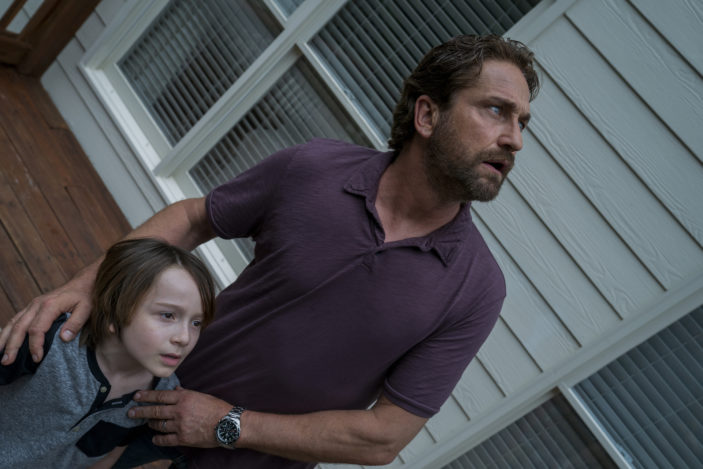
When it was known that Gerard Butler would be reuniting with his Angel Has Fallen director Ric Roman Waugh for a disaster movie, I think we all had an idea of what type of movie it could be. Guaranteed, Greenland would not have been the outcome in anyone’s frontal cortex. Shifting focus away from the CGI-heavy explosions that so many of these type of destructive genre films incorporate (although this does have its share for good measure), Greenland is a surprisingly emotional and human tale, a more reactive take on what someone would do in such a situation as a meteoric shower.
Before all hell breaks loose in a crowd-mob capacity that feels all too familiar now in the COVID way of existence, Greenland sets up its hook with a comet dubbed Clarke, a sky-streaker that, despite being visible to Earth, is reported as not being a threat. The forecasters predicting it will break up enough upon entering the Earth’s atmosphere and therefore be essentially harmless are wildly wrong though, with Clarke proving a force destructive enough to kill the planet.
So where does our dear Mr. Butler come into proceedings? Thanks to his John Garrity being a structural engineer, he’s selected in a prestigious lottery of people that have been deemed important enough to be saved in such an event – his skill of building clearly an asset for the eventual rebuilding of civilisation. It may sound a little far fetched but Chris Sparling‘s script and Butler’s surprisingly grounded performance make it organically plausible. Packing up the most minimalistic of bags, John, his estranged wife Allison (Morena Baccarin), and their young son Nathan (Roger Dale Floyd) proceed to a classified airfield where they are to be whisked away to a bunker in Greenland; the film’s real first hit of emotion arrives when the family is leaving and John and Allison’s next-door neighbours plead with them to save some of the other young children in the area.
When John and Allison are separated from one another in a panicked mishap, and she is then denied entry when the officials discover Nathan is diabetic – anyone with a pre-existing illness isn’t allowed to advance to the bunker – Greenland slowly adopts the more action-leaning narrative that audiences are likely to have expected much earlier on in its near-two hour running time. And whilst we are subjected to meteoric fragments raining down on civilians, a brief kidnapping plot, and a general race against the elements mentality, the film never entirely goes balls-to-the-wall in any aspect.
Given the pandemic has struck the world in the way it has, and that aforementioned mob mentality of panic is something that’s all too commonplace, Greenland feels like a more effective creation watching it now. There’s anguish and an emotional response behind much of the film’s actions, and that’s what ultimately keeps it afloat when it does adhere to some of the more blockbuster sentiments and the geographical logic that comes further undone the more you analyse beyond what it asks.
This is a perfectly suitable action film, but Greenland‘s true drawcard is its dramatic temperament, grounded by a genuine sense of fear and a surprisingly tender turn from Butler, whose alpha-void character reminds us of the great actor he can be when he isn’t slumming it for the sake of an easy paycheque.
![]()
![]()
![]()
![]()
![]()
THREE AND A HALF STARS (OUT OF FIVE)
Greenland is on Blu-ray™, DVD and On Demand from STXfilms and Universal Pictures Home Entertainment in the United States and to stream on Amazon Prime Video in Australia.
